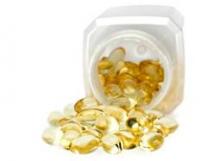Far from preventing prostate cancer, vitamin E supplements actually raise the risk of the malignancy by 17% in the general population of healthy men, according to a report in the Oct. 12 JAMA.
The increase in risk became evident after extended follow-up in SELECT (Selenium and Vitamin E Cancer Prevention Trial), a large international study that was discontinued earlier than planned, in 2008, because an interim analysis showed that neither vitamin E nor selenium supplements reduced the risk of prostate cancer.
"Given that more than 50% of individuals 60 years or older are taking supplements containing vitamin E and that 23% of them are taking at least 400 IU per day, despite a recommended daily dietary allowance of only 22.4 IU for adult men, the implications of our observations are substantial," said Dr. Eric A. Klein of the Glickman Urological and Kidney Institute at the Cleveland Clinic, and his associates.
The 35,533 men enrolled in the study at 427 sites were randomly assigned to receive oral selenium (200 mcg/day) plus placebo, vitamin E (400 IU/day) plus placebo, both active agents, or two placebos, and were followed for a median of 5.5 years. When the trial was halted early, the data and safety monitoring committee "expressed concern about the increased risk of prostate cancer observed in the vitamin E plus placebo group, which approached statistical significance," the investigators said.
Follow-up has since continued for an additional 3 years. "The current report includes data as of July 5, 2011. There are 54,464 additional person-years of follow-up since the primary report, an increase of 23%," Dr. Klein and his colleagues explained.
There have been no differences among the study groups in the intensity of PSA testing or in absolute PSA levels.
An additional 521 prostate cancers have been diagnosed since the initial SELECT results were published. These included 113 in the placebo group, 147 in the vitamin E group, 143 in the selenium group, and 118 in the combined therapy group.
The incidence of prostate cancer rose significantly only in the vitamin E group. This elevated risk occurred with both low-grade and high-grade tumors (JAMA 2011;306:1549-56).
"The difference in rates of prostate cancer between vitamin E and placebo became apparent during the participants’ third year in the trial, at which point the [hazard ratio] was 1.10, and increased slightly each year thereafter. ... The unadjusted absolute increase in risk of cases of prostate cancer per 1,000 person-years compared with placebo was 1.6 for vitamin E, 0.8 for selenium, and 0.4 for the combination," the investigators noted.
Extended follow-up also showed that there were no significant differences among the study groups in rates of type 2 diabetes; lung, colorectal, and total cancers; mortality; or grade 4 cardiovascular events. This suggests "neither benefit nor harm from dietary supplementation with selenium or vitamin E for these end points," they added.
No biological explanation for the increased risk of prostate cancer is apparent yet. Since there was no increased risk with combined vitamin E plus selenium, selenium may exert a "dampening" influence on vitamin E’s effect.
"Tests of this hypothesis and other potential explanations for the results will be addressed" in future analyses of SELECT data and in further follow-up of the study subjects. Meanwhile, the findings demonstrate "the potential for seemingly innocuous yet biologically active substances such as vitamins to cause harm," Dr. Klein and his associates said.
The lack of benefit from vitamin E demonstrated in this study, together with its potential for harm, "underscore the need for consumers to be skeptical of health claims for unregulated over-the-counter products," they added.
This study was supported by the National Cancer Institute and the National Center for Complementary and Alternative Medicine. Study drugs and packaging were provided by Perrigo, Sabinsa, Tishcon, and DSM Nutritional Products. Dr. Klein’s associates reported ties to numerous industry sources.


